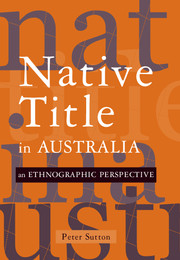Book contents
- Frontmatter
- Contents
- List of Figures
- Acknowledgements
- Introduction
- Map
- Chapter 1 Kinds of Rights in Country
- Chapter 2 Local Organisation Before the Land Claims Era
- Chapter 3 Aboriginal Country Groups
- Chapter 4 Atomism versus Collectivism
- Chapter 5 Underlying and Proximate Customary Titles
- Chapter 6 The System Question
- Chapter 7 Kinship, Filiation and Aboriginal Land Tenure
- Chapter 8 Families of Polity
- Notes
- References
- Index
Chapter 2 - Local Organisation Before the Land Claims Era
Published online by Cambridge University Press: 22 September 2009
- Frontmatter
- Contents
- List of Figures
- Acknowledgements
- Introduction
- Map
- Chapter 1 Kinds of Rights in Country
- Chapter 2 Local Organisation Before the Land Claims Era
- Chapter 3 Aboriginal Country Groups
- Chapter 4 Atomism versus Collectivism
- Chapter 5 Underlying and Proximate Customary Titles
- Chapter 6 The System Question
- Chapter 7 Kinship, Filiation and Aboriginal Land Tenure
- Chapter 8 Families of Polity
- Notes
- References
- Index
Summary
There is not enough space here to offer a comprehensive history of ideas about Aboriginal local organisation and land tenure, but gaining some grasp of that history is relevant to understanding the anthropological evidence that is put forward in native title cases. This is partly because significant early records of Aboriginal societies and their normative practices were made by people who framed the publication of their results in terms of the theoretical apparatus of their time. Some used technical terms of the day, many of which still survive, often with different meanings. Readers unfamiliar with anthropological terms of art, especially in the field of kinship, should read Chapter 7 before proceeding.
We cannot assume that a technical term in common use in 1890 has the same meaning attributed to it by present-day scholars, for example. More importantly, it is always sobering and informative to learn to what degree the empirical observations and insights of the past were moulded, in their public presentation, by the intellectual schemes and paradigms brought to them by those earlier practitioners. Les Hiatt has provided a valuable historical analysis of some major topics in Australian social anthropology of the colonial era and up to recent times in his Arguments About Aborigines, including a review of the evolution of ideas about local organisation. Here I focus on fewer sources in greater detail, but refer the reader to Hiatt's book for some wider context.
- Type
- Chapter
- Information
- Native Title in AustraliaAn Ethnographic Perspective, pp. 38 - 53Publisher: Cambridge University PressPrint publication year: 2003

